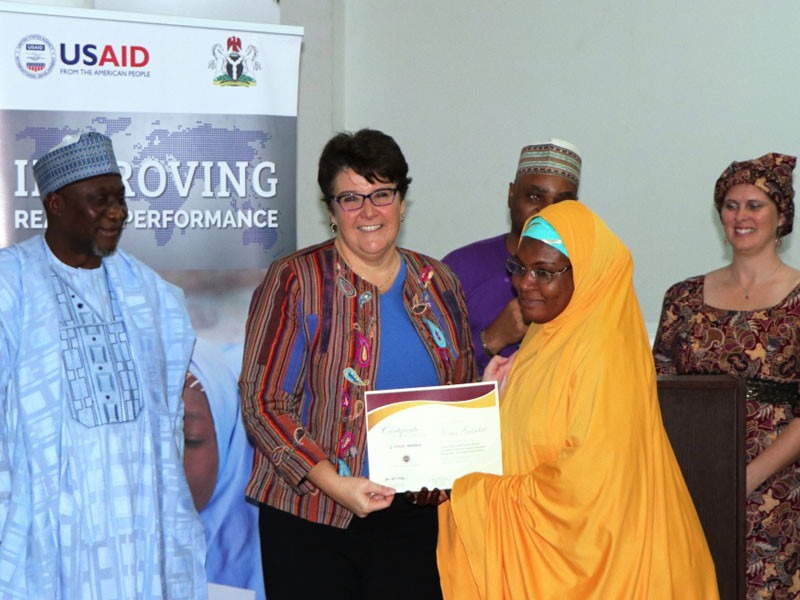USAID builds expertise for early grade reading in Nigeria
By Boco Edet AbdulFebruary 1, 2019
ABUJA, Nigeria – In its ongoing effort to institutionalize early grade reading in Nigeria, the Northern Education Initiative Plus project trained a second cohort of education professionals on global best practices in basic literacy.
Twenty-two education experts working at state and federal levels in Nigeria were awarded certificates at a graduation ceremony held in Abuja. This second cohort of teacher educators, researchers and government education officials from across Nigeria successfully completed a five-month postgraduate course entitled, Literacy Skills in the Primary School: A Graduate Course for Teacher Educators.
Implemented by the U.S. Agency for International Development’s Northern Education Initiative Plus activity in partnership with Florida State University, the program already graduated a first cohort of more than 20 professionals from the course in October 2017. Now certified in basic literacy, these professionals have skills to implement sustainable reading programs for primary school children throughout the country.
A broader effort to improve reading education
The early grade reading course is part of a wider strategy to implement reading programs across Nigeria, on a national scale. The course builds upon the innovative, early grade reading program Mu Karanta!/Let’s Read! that was introduced by the Northern Education Initiative Plus in 2016. So far, the program has supported learning to read and write, in Hausa and English languages, for nearly 500,000 primary school students in schools in Bauchi and Sokoto states.

Denise O’Toole, Director of Education programming for USAID in Nigeria, was on hand to congratulate and encourage the graduates to become “agents of change,” advocating for improved learning outcomes for children in reading. She added that the U.S. government will continue to support the government of Nigeria to enhance education, particularly in early grade reading.
“We hope your new membership into this important group of professionals will make a huge difference as we work towards a successful scholastic future for all Nigerian students,” she said.
Representing the Minister of Education, the Executive Secretary of the Nigerian Educational Research and Development Council, Professor Ismail Junaidu, said the government of Nigeria is making a concerted effort to institutionalize early grade reading in Nigeria.
At the forefront of this effort is the institution’s leadership in developing a National Reading Framework, which draws upon the Mu Karanta!/Let’s Read! model for early grade reading in Bauchi and Sokoto states.
“Having a cadre of Nigerian professionals grounded in expertise and knowledge on reading will help us achieve this goal, as we want all states in Nigeria to implement reading programs,” Junaidu said.
Acting Chief of Party Nurudeen Lawal said the graduates will form professional learning communities in their various organizations. The course graduates will continue to work collaboratively through these new learning communities to improve reading skills in schools and influence education policy.
As part of the course requirements, participants observed classroom lessons, reviewed published articles on early grade reading, and conducted independent research projects.
Carrying the work forward
Following the graduation ceremony, the participants announced plans to form a new organization, the Early Grade Reading Association of Nigeria. The group will organize community outreach programs to promote reading across the country.
One of the graduates, Omale Allen Abduljabar, said the group had pledged to continue to advocate for early grade reading beyond their participation in the course.
“In my agency, I will stepdown the program to other units, but will also be part of a committee to monitor and evaluate how my fellow graduates are practicing skills they have acquired during the program,” he said.
Participants in the postgraduate program included education professionals from Bauchi and Sokoto State Ministries of Education, the State Universal Basic Education Boards, Nigeria’s Federal Ministry of Education, the Nigerian Educational Research and Development Council, the National Commission for Colleges of Education, the Universal Basic Education Commission and the National Commission for Mass Literacy.
In less than four years, USAID’s Northern Education Initiative Plus has made significant progress strengthening the implementation of early grade reading in Nigeria. The USAID-funded activity is achieving this goal through its support for the National Commission for Colleges of Education. The commission has pledged to integrate early grade reading into the Nigeria Certificate in Education curriculum for teacher educators. For its part, the Nigerian Educational Research and Development Council has begun the process of developing a National Reading framework for Nigeria, with technical support from the Northern Education Initiative Plus activity.

